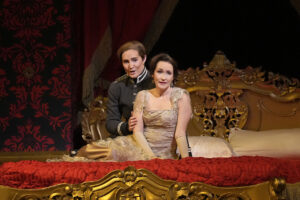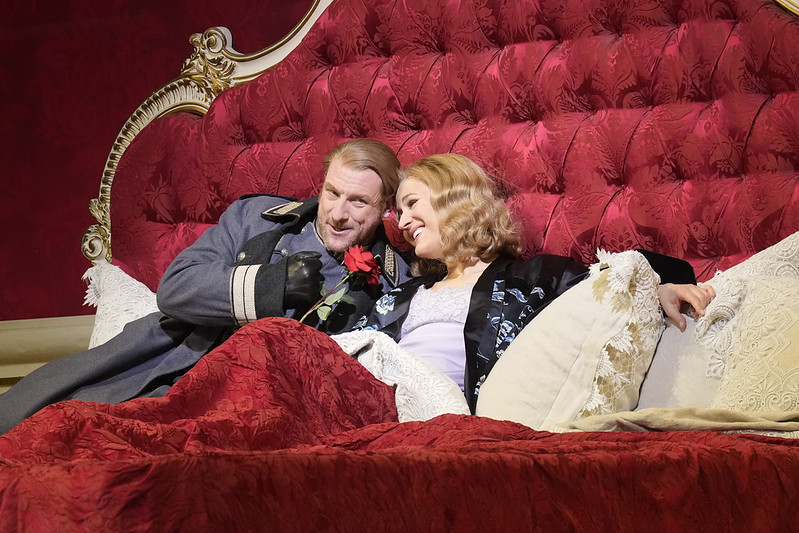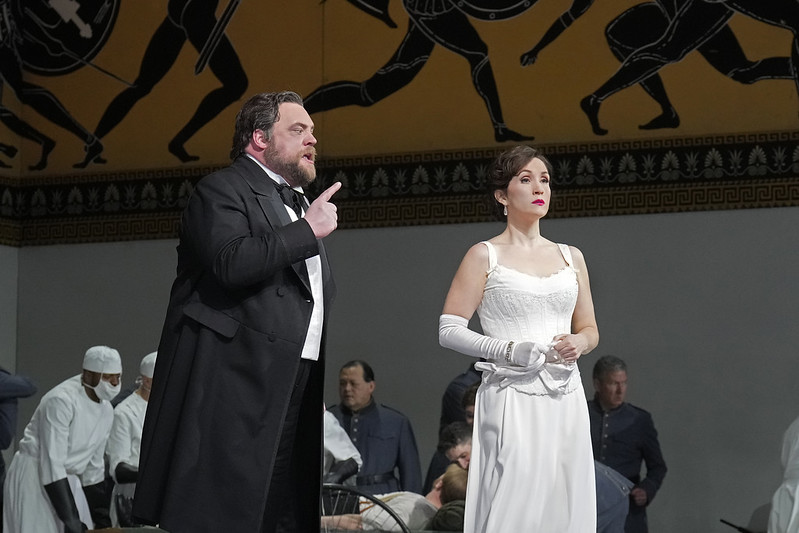
Metropolitan Opera 2022-23 Review: Der Rosenkavalier
Erin Morley & Samantha Hankey Deliver the Musical Goods in Strong Revival of Strauss Masterwork
By David Salazar(Credit: Ken Howard)
Over the past few seasons, few artists have gotten as much buzz as soprano Lise Davidsen. She’s been called “A Voice in a Million” by none other than Antonio Pappano and she’s become a major Met fixture, garnering top billing in numerous Strauss operas over the past few seasons.
Perhaps none came with greater than anticipation than the Marshallin in “Der Rosenkavalier,” a role dominated by many of the great Strauss divas of the past.
Queen of the Night?
On paper, the Marshallin should be a natural fit for Davidsen. An authoritative figure whose vocal appearances, especially in the final act, are meant to express this authority. And there’s no doubt that from her arrival in that final Act, wearing an imposing black dress to match her similarly statuesque presence, Davidsen was the embodiment of the empress. Her singing resonated wondrously and fluidly as she set the chaos around her in order. During the famed confrontation with Sophie and Octavian that climaxes in the beloved trio “Hab’ mir’s gelobt, ihn lieb zu haben,” her singing took on a gentler complexion that allowed Davidsen to make full use of her ample color palette. As the trio grew and grew, there’s no doubt that her powerful voice dominated the ensemble, rising above it all into full bloom.
Davidsen was similarly potent in the early duet with Samantha Hankey’s Octavian, their voices blending beautifully together and she provided an ample counterpoint during their dramatic conversation at the close of the Act, Davidsen’s voice shifting between potent and authoritative to more delicate and empathetic, emphasizing how the more dramatic and romantic moments suited her voice and artistic temperament.
Where Davidsen fell short were in moments where more characterization was required from the Marshallin. There’s a passage where she describes Och’s entrance. It’s a tense moment as Octavian has to figure out a way to hide and not be discovered – the Marshallin’s narration builds an image of the impending doom coming her way. Moreover, the Marshallin thinks it’s her husband. There’s no reproach toward the rhythmic exactness of Davidsen’s delivery or the clarity of sound, but she lacked any ability to build the passage in any dramatic way to help the audience feel her stress and tension – those not following the subtitles or not knowledgeable in German would likely have missed the moment altogether. Likewise, her entire interaction with Ochs, a scene in which Davidsen, again vocally accurate, looked rather passive and disengaged dramatically.

(Credit: Ken Howard)
Potent Dramatically, But Not Quite Vocally
That scene would have imploded if not for bass-baritone Günther Groissböck who in many ways the dramatic polar opposite of Davidsen. A renowned and successful veteran of this production of “Der Rosenkavalier,” you could never criticize him for disengagement for he was always in character, always seemingly seeing the limits of how far he could push his Ochs. At times this could shift into quasi-caricature, especially with his emphatic groping of other women. But at others he added certain layers to the character, such as when he slid suavely across the bed in the opening act to try and flirt with Mariandel; at times his waltz-dancing also suggested an elegance to the Baron, perhaps something left over from years past. But his constant pushing of the edges in terms of his characterization gave the opera a buoyancy and fun that would have been utterly lacking without it.
That said, his vocal characterization was nowhere near the level of his physical portrayal. His diction is irreproachable but his instrument sounds harsh and dry. The highs can sound a bit pushed and often resonate with a hollow straight tone. The low notes barely resonate; the second Act ends with a low E and while Groissböck managed to vocalize the note, it was barely audible and sounded unsupported. At other instances, the lows sounded more like forceful growls. One might argue that a harsh, aggressive, and abrasive sound works for a character as broken and despicable as Ochs; he is literally the main male voice in a cast dominated by women and being an outsider vocally helps to distinguish him.
To a certain degree, one might accept this if it was purely a character choice, but having heard Groissböck perform as King Heinrich in “Lohengrin” on Saturday, it was clear that while some were character choices, the inaudible lows and the pushed highs are a feature of Groissböck’s current vocal package.
Completing the Picture
The two most complete performances of the night came from Samantha Hankey and Erin Morley as the two lovers, Octavian and Sophie. Hankey displayed tremendous warmth as Octavian, allowing the character to grow from a naïve young man to a clever and powerful man ready to fight for love. One of her strongest moments was the second Act confrontation with Ochs where, try as she might to imbue Octavian with confidence as he repeated “Die Fraulein,” you could sense the trepidation and fear. Moments later, when her Octavian finally stands up to Ochs and challenges him, you could start to feel the character’s maturity develop, her voice taking on a more pointed and assertive potency.
That all allowed for Octavian’s maturity to come to fulfillment in the third Act where Hankey and Groissböck delivered the most potent scene of the entire evening. Disguised as Mariandel, Hankey pushed the limits of her vocal palette, opting for a nasal quality that matched some of Groissböck more’s abrasive sounds. Throughout the first half of this act, she flirted around the staged with an over-the-top sensuality that bordered on sexy and grotesque – perfect for the scene’s content.
What works so well about “Der Rosenkavalier” is how it charts Octavian’s coming-of-age in such a way as to show us his growth into a man and then… just when he’s succeeded, pushes him back to face his greatest test of maturity – owning it in front of the women who he had forgotten despite swearing to never abandon her a few acts earlier. In this moment, Hankey’s seemingly growing irresistible force came to a literal standstill, her movements rigid, her gaze seemingly stuck between the two women – a character at a crossroads. The vocal diversity of the opening two acts suddenly took on a gentler complexion that called back to the naïve boy from the start.
It all transformed in those final moments where, following the trio, Octavian and Sophie pledge their love to one another in a glorious duet. Here, Hankey’s voice melded beautifully with Morley’s, just as it had in their Act two duet where they first pledged love to one another.
Morley, another veteran of this production, continued to do what she’s been doing at the Met over the past few years – displaying her star power. From her very first entrance in Act two, her Sophie was an innocent woman, but a sophisticated one, her singing fluid and pristine to match these traits. The role calls for a lot of singing in the upper register and Morley always delivered this with confident bravura; there was an evenness in her singing throughout that was perhaps only matched by Hankey.
But she also imbued her Sophie with a sincere fighting spirit that added to our endearment for the character as well as to the comic hijinks, especially throughout Act two. Most potent was her chemistry with Hankey, their singing coalescing constantly in their duets together, almost as if one.

(Credit: Ken Howard)
It isn’t often that an interpreter of Herr von Faninal stands out from amidst the main cast, but it must be said that Brian Mulligan certainly did (he was also delivered a magnetic vocal performance in the role of the Herald in “Lohengrin”). His gentle timbre, imbued with passionate delivery, allowed his Faninal to be a man who has no authority and yet constantly seems bent on fighting for it; this contradiction gave his appearances a comic potency every time.
Meanwhile Katharine Goeldner and Thomas Ebenstein were a solid pairing as Annina and Valzacchi, both clearly enjoying themselves throughout.
As the Italian singer René Barbera delivered a confident vocal display, with plush squillo in the upper range and tremendous legato; to say that he commanded the entire Met auditorium during his moment is an understatement as this was singing of the highest order.
In the pit, Simone Young conducted a propulsive reading of “Der Rosenkavalier.” The opening horn passage, a notoriously difficult passage, was delivered with aplomb, and most of the few explosive moments of the score resonated gloriously throughout the hall. But for me, the most potent moments in her reading were the gentler ones, particularly her take on the waltz, which was delivered on edge. On one hand, there was a charm and elegance to the lyrical writing; but there was also a touch of heavy-handedness with percussion entrances that played nicely into depicting the Baron’s character – a scheming, grotesque human dressed up as a man of nobility.
Robert Carsen’s “Der Rosenkavalier” remains one of the Met’s strongest of the last few years (read more here). In past reviews I have noted that the Marshallin showing up at the brothel is a major problem and yet, upon reflection, so is having her show up at a tavern, as is originally scripted in the original opera. As such, I think the issue is less with the production and more with the libretto itself.
In any case, this production of “Der Rosenkavalier” is definitely one that operates on a high level musically and, mostly, dramatically. While eyes and ears are most likely on Davidsen (and the final applause certainly confirms that this was the point of greatest attraction and approval), Hankey and Morley carry the night musically while Groissböck does so comically and dramatically.


